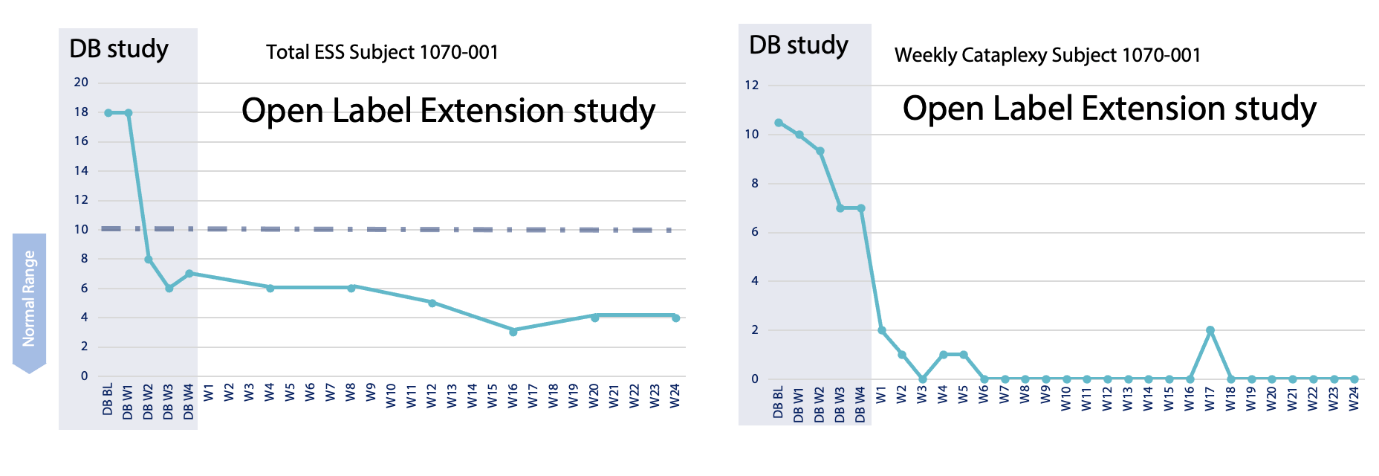NLS Pharmaceutics Announces Open Label Extension Study Six-Month Data for Quilience(R) (Mazindol ER) in the Treatment of Narcolepsy Type 1 and Type 2
NLS Pharmaceutics Ltd. announced results from its six-month Open Label Extension (OLE) study for Quilience® (Mazindol ER) in treating narcolepsy. Of the 60 patients completing the Phase 2 trial, 87% continued into the OLE, showing increased effectiveness in managing excessive daytime sleepiness and cataplexy episodes. Patients previously on placebo also achieved similar results after switching to Mazindol ER. Overall, the safety and tolerability profile remained consistent, with no serious adverse events reported. The Phase 3 program is set to begin mid-2023 after an FDA meeting in late April.
- 87% patient participation in the OLE study indicates strong interest.
- Mazindol ER showed continuous improvement in excessive daytime sleepiness, with mean ESS scores reaching 8.9.
- Over 80% reduction in weekly cataplexy episodes in all patients.
- No serious adverse events related to treatment were reported, confirming safety.
- None.
Insights
Analyzing...
- Patients treated with Mazindol ER in the randomized Phase 2 trial showed continued improvement after rolling over into the open label extension (OLE) study
- Patients treated with placebo in the randomized Phase 2 trial and who subsequently received Mazindol ER in the OLE study achieved comparable results to the Mazindol ER-treated patients in the Phase 2 trial
- Safety and tolerability of Mazindol ER were similar between the randomized trial and the OLE study
- Once-daily monotherapy with Mazindol ER shows potential to meet the unmet needs of currently available narcolepsy treatment options
ZURICH, SWITZERLAND / ACCESSWIRE / March 27, 2023 / NLS Pharmaceutics Ltd. (Nasdaq:NLSP, NLSPW) ("NLS" or the "Company"), a Swiss clinical-stage biopharmaceutical company focused on the discovery and development of innovative therapies for patients with rare and complex central nervous system disorders, today announced the final results from its Open Label Extension (OLE) Study for Quilience® (Mazindol ER) in the treatment of narcolepsy. The OLE study offered patients completing the 4-week randomized, double blind (DB) Phase 2 trial for Mazindol ER the option to receive the drug candidate, Mazindol ER, for an additional 6 months as a once-daily, monotherapy on an open-label basis. Of the 60 patients who completed the randomized controlled DB Phase 2 trial,

Excessive Daytime Sleepiness
This 6-month OLE study of Mazindol ER, a first in class, unique dual mechanism of action pan-monoamine reuptake inhibitor and orexin-2 partial receptor agonist, showed that patients treated with Mazindol ER in the randomized Phase 2 trial (DB) saw an additional improvement of 0.8 (SD=2.86) points in excessive daytime sleepiness (EDS) on the Epworth Sleepiness Scale (ESS). At the conclusion of the OLE, the mean ESS score for these patients reached 8.9 (SD=6.12), with lower scores denoting an improvement in the condition (improved wakefulness). Of note, ESS scores of 10 or below are considered typical scores for subjects without narcolepsy.
As previously concluded in the interim analysis of the OLE reported in September 2022, these data indicate that maximum efficacy on ESS with Mazindol ER is reached at approximately 2 months of treatment, and these scores were subsequently maintained throughout the 6-month OLE duration. Overall, the mean ESS score for these patients declined by approximately 10.2 (SD=5.83) points from their DB study baseline to month 6 in the OLE.
Similarly, patients receiving placebo in the DB Phase 2 trial who rolled over to receive Mazindol ER in the OLE study, saw an improvement in ESS scores, declining to levels comparable to those treated with Mazindol ER in both the DB and OLE trials. This effect was maintained through the 6-month OLE study, with ESS scores similar to the DB Mazindol ER group.

Cataplexy Episodes
Patients with Narcolepsy Type 1 (NT1), treated with Mazindol ER in the randomized Phase 2 trial, experienced a mean number of weekly cataplexy episodes of approximately 2.9 (SD=4.30) at the end of the 4-week DB period, down from a baseline level of approximately 16.6 (SD=10.96) at the beginning of the trial. During the 6-month OLE study, mean weekly cataplexy episodes for these patients remained relatively stable in the 2 to 4 range through week 24.
For NT1 patients with cataplexy receiving placebo in the DB Phase 2 trial, the mean number of weekly cataplexy episodes was approximately 10.3 (SD=12.11) at the end of the 4-week double-blind period. During the 6-month OLE study, when treated with Mazindol ER, these patients caught up to previously treated patients, achieving mean weekly cataplexy episodes of 3.8 (SD=7.05) at 8 weeks of treatment. This favorable effect was maintained for these patients in the 2-4 episodes per week range throughout the 6-month OLE study. For both groups, the mean reduction in weekly cataplexy episodes was more than

Notably, there were patients diagnosed with Narcolepsy Type 1 who achieved zero weekly cataplexy episodes in the OLE study, with some of those maintaining this effect through week 24. For example, the graphs below show the results of a 23 year-old female with NT1 who received Mazindol ER in both the DB and OLE study periods.

Safety & Tolerability
- This study showed favorable subject participation (
87% ) and retention (71% ), especially given the broad exclusion of all narcolepsy, depression, and anxiolytic medications, as well as other medications such as oral contraceptives. - There were no treatment-related serious adverse events.
- The most frequent (>
5% ) adverse events were dry mouth, COVID-19, constipation, urinary tract infection and nausea. - The results confirmed that Mazindol was safe and well tolerated, with no unexpected adverse events throughout the combined studies.
"The open label extension study further validates the safety and tolerability seen in the DB Phase 2 trial, while demonstrating further efficacy gains with longer treatment duration, beyond the original 4 weeks of DB treatment," said George Apostol, MD, Chief Medical Officer of NLS Pharmaceutics. "These data, along with numerous preclinical studies conducted this year, show the potential for Mazindol ER as a once-daily monotherapy to meet the unmet needs of current narcolepsy patients. We look forward to sharing the full data set from the final OLE results along with our Phase 2 clinical trial in Indianapolis at SLEEP 2023, a conference hosted by the American Academy of Sleep Medicine (AASM), this June."
The Phase 3 program for Mazindol ER (mazindol ER) is currently on track to commence in mid- 2023 following the End of Phase 2 meeting with the U.S. Food and Drug Administration (FDA) scheduled in the first calendar quarter of 2023. Final minutes of the FDA meeting are expected in late April 2023.
About NLS Pharmaceutics Ltd.
NLS Pharmaceutics Ltd. (Nasdaq:NLSP) is a global development-stage biopharmaceutical company, working with a network of world-class partners and internationally recognized scientists, focused on the discovery and development of innovative therapies for patients with rare and complex central nervous system, or CNS, disorders, who have unmet medical needs. Headquartered in Switzerland and founded in 2015, NLS is led by an experienced management team with a track record of developing and commercializing product candidates. For more information, please visit www.nlspharma.com.
About Quilience®
The Company's lead product candidate, Quilience®, is a proprietary extended-release formulation of mazindol (mazindol ER) and is being developed for the treatment of narcolepsy, and potentially other sleep-wake disorders such as Idiopathic Hypersomnia (IH), for which NLS recently obtained Orphan Disease Designation (ODD) from the U. S. Food and Drug Administration (FDA) and the European Medicines Agency (EMA). Mazindol is a triple monoamine reuptake inhibitor and partial Orexin-2 Receptor agonist, which was used for many years to treat patients diagnosed with narcolepsy in compassionate use programs. A Phase 2 multi-center U.S. clinical study evaluating Quilience® in adult patients suffering from narcolepsy met its primary endpoint with high statistical significance and demonstrated a favorable safety and tolerability profile. NLS also successfully completed a Phase 2 study in the U.S. evaluating Nolazol® (Mazindol Controlled-Release) in adult patients suffering from ADHD. The study met all primary and secondary endpoints and Nolazol® was well-tolerated. Quilience® has received Orphan Drug Designations both in the U.S. and in Europe for the treatment of narcolepsy. Up to 1/3 of narcoleptic patients are also diagnosed with ADHD.
Safe Harbor Statement
This press release contains expressed or implied forward-looking statements pursuant to U.S. Federal securities laws. For example, NLS is using forward-looking statements when it discusses the potential benefits of mazindol ER, the the OLE study results further validate the safety and tolerability seen in the DB Phase 2 trial, the potential for Mazindol ER as a once-daily monotherapy to meet the unmet needs of current narcolepsy patients, the expected timing of the release of the full data set from the OLE study, the expected timing of the phase 3 program for Mazindol ER and the expected End of Phase 2 meeting with the FDA. These forward-looking statements and their implications are based on the current expectations of the management of NLS only and are subject to a number of factors and uncertainties that could cause actual results to differ materially from those described in the forward-looking statements. The following factors, among others, could cause actual results to differ materially from those described in the forward-looking statements: changes in technology and market requirements; NLS may encounter delays or obstacles in launching and/or successfully completing its clinical trials; NLS' products may not be approved by regulatory agencies, NLS' technology may not be validated as it progresses further and its methods may not be accepted by the scientific community; NLS may be unable to retain or attract key employees whose knowledge is essential to the development of its products; unforeseen scientific difficulties may develop with NLS' process; NLS' products may wind up being more expensive than it anticipates; results in the laboratory may not translate to equally good results in real clinical settings; results of preclinical studies may not correlate with the results of human clinical trials; NLS' patents may not be sufficient; NLS' products may harm recipients; changes in legislation may adversely impact NLS; inability to timely develop and introduce new technologies, products and applications; and loss of market share and pressure on pricing resulting from competition, which could cause the actual results or performance of NLS to differ materially from those contemplated in such forward-looking statements. Except as otherwise required by law, NLS undertakes no obligation to publicly release any revisions to these forward-looking statements to reflect events or circumstances after the date hereof or to reflect the occurrence of unanticipated events. More detailed information about the risks and uncertainties affecting NLS is contained under the heading "Risk Factors" in NLS' annual report on Form 20-F for the year ended December 31, 2021 filed with the Securities and Exchange Commission (SEC), which is available on the SEC's website, www.sec.gov, and in subsequent filings made by NLS with the SEC.
For additional information:
Marianne Lambertson (investors & media)
NLS Pharmaceutics Ltd.
+1 239.682.8500
ml@nls-pharma.com
www.nlspharmaceutics.com
SOURCE: NLS Pharmaceutics AG
View source version on accesswire.com:
https://www.accesswire.com/745926/NLS-Pharmaceutics-Announces-Open-Label-Extension-Study-Six-Month-Data-for-QuilienceR-Mazindol-ER-in-the-Treatment-of-Narcolepsy-Type-1-and-Type-2







